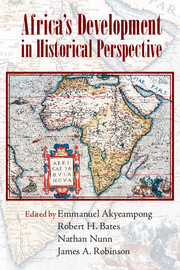Book contents
- Frontmatter
- Contents
- Author Biographies
- Acknowledgments
- Introduction
- Part I La Longue Durée
- Part II Culture, Entrepreneurship, and Development
- 5 Redistributive Pressures in Sub-Saharan Africa: Causes, Consequences, and Coping Strategies
- 6 Accumulation and Conspicuous Consumption: The Poverty of Entrepreneurship in Western Nigeria, ca. 1850–1930
- 7 Commerce, Credit, and Mobility in Late Nineteenth-Century Gold Coast: Changing Dynamics in Euro-African Trade
- 8 The Textile Industry of Eastern Africa in the Longue Durée
- 9 Explaining and Evaluating the Cash Crop Revolution in the “Peasant” Colonies of Tropical Africa, ca. 1890–ca.1930: Beyond “Vent for Surplus”
- 10 Reinventing the Wheel: The Economic Benefits of Wheeled Transportation in Early Colonial British West Africa
- 11 Mbanza Kongo/São Salvador: Culture and the Transformation of an African City, 1491 to 1670s
- Part III Institutions
- Part IV External Forces
- Index
- References
6 - Accumulation and Conspicuous Consumption: The Poverty of Entrepreneurship in Western Nigeria, ca. 1850–1930
Published online by Cambridge University Press: 05 September 2014
- Frontmatter
- Contents
- Author Biographies
- Acknowledgments
- Introduction
- Part I La Longue Durée
- Part II Culture, Entrepreneurship, and Development
- 5 Redistributive Pressures in Sub-Saharan Africa: Causes, Consequences, and Coping Strategies
- 6 Accumulation and Conspicuous Consumption: The Poverty of Entrepreneurship in Western Nigeria, ca. 1850–1930
- 7 Commerce, Credit, and Mobility in Late Nineteenth-Century Gold Coast: Changing Dynamics in Euro-African Trade
- 8 The Textile Industry of Eastern Africa in the Longue Durée
- 9 Explaining and Evaluating the Cash Crop Revolution in the “Peasant” Colonies of Tropical Africa, ca. 1890–ca.1930: Beyond “Vent for Surplus”
- 10 Reinventing the Wheel: The Economic Benefits of Wheeled Transportation in Early Colonial British West Africa
- 11 Mbanza Kongo/São Salvador: Culture and the Transformation of an African City, 1491 to 1670s
- Part III Institutions
- Part IV External Forces
- Index
- References
Summary
The failure to develop a concept of business as an impersonal and long-term occupation helps to explain why, in spite of its many attributes, the African business community in Lagos was unable to produce a capitalist class capable of competing successfully with expatriate firms.
(Hopkins 1964, 444)Introduction
The underdevelopment of West African entrepreneurship, epitomized by the near-total absence of an indigenous capitalist class, alluded to here by Professor A. G. Hopkins, has been examined within the framework of divergent explanations – cultural versus structural. In the same vein, Gareth Austin, pondering the “basic question … [of] the apparent rarity of transgenerational continuity of specific businesses in West Africa,” suggested any of three possibilities for further investigation: the institutional (cultural issues, such as inheritance practices); the general instability of economic life (the vicissitudes and risks associated with enterprises); and the changes wrought by colonial intervention. Against the background of the propositions by Hopkins and Austin, this chapter argues, first, that the cultural context was as important as the constraining structure of British colonialism in explaining the underdevelopment of indigenous entrepreneurship, and, second, that both dynamics should be taken together in any meaningful explanation. The importance of the cultural dynamic, highlighted in this chapter, is anchored on indigenous Yoruba conceptions of accumulation, wealth, and social status.
First, the Yoruba distinguished among the poor (akuse, olòsì, and tálíkà), the rich (olówó), the wealthy (olórò or olólà), and the honorable person (olólá). Second, they esteemed the wealthy, who had property and assets (olórò or olólà) above the possessor of mere cash (olówó). Third, as society also prioritized honor, a person who combined honor and wealth with generosity – the bòròkìní or gbajúmò – was the ideal entrepreneur (Falola 1984, 71). The profiles of nineteenth- and twentieth-century Yoruba entrepreneurs in Lagos and its hinterland show that, with few exceptions, the aspiring bòròkìní or gbajúmò eagerly sought to earn societal approval.
- Type
- Chapter
- Information
- Africa's Development in Historical Perspective , pp. 208 - 230Publisher: Cambridge University PressPrint publication year: 2014
References
- 2
- Cited by



